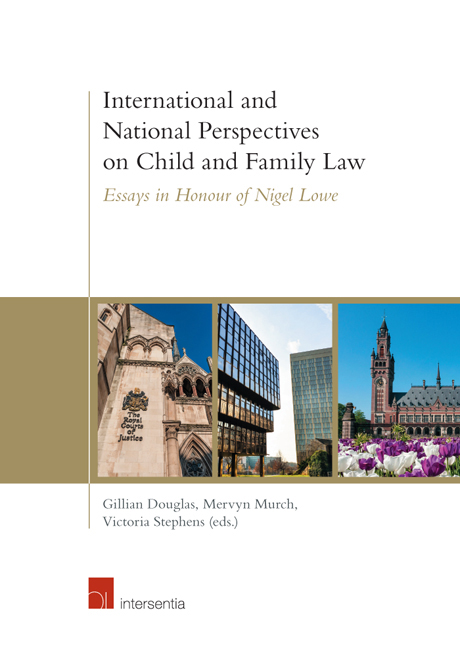Book contents
- Frontmatter
- Foreword
- Acknowledgements
- Contents
- List of Cases
- List of Contributors
- Introduction: Nigel Vaughan Lowe: An Appreciation
- Part I Family and Child Law in England and Wales
- Part II International Family Law
- Judging Parental Child Abduction: What Does it Mean to Adopt a Children's Rights-Based Approach?
- Judicial Activism: A 20-Year Evolution
- Globalisation of Adjudication in International Family Law: Serving International Families by Producing International Solutions
- Creating International Families: Private International Law and the Industry of Parenthood
- Issues in International Divorce Cases
- Non-Judicial Divorce in France: Progress or a Mess?
- The Istanbul Convention: Is Domestic Abuse Violence Against Women?
- Nationality and Migration Status in International Children's Law
- The Development of Child Protection Across International Borders for Children at Risk of Harm
- Nigel Lowe and International Family Law: An Immense Contribution
- The Spanish Constitutional Court and Protracted Child Abduction Proceedings: Time is of the Essence
- Non-Recognition of Child Marriages: Sacrificing the Global for the Local in the Aft ermath of the 2015 ‘Refugee Crisis’
- Juvenile Justice in Bulgaria: Reforms and Resistance
- Overriding Mandatory Provisions in EU Family Law Regulations
- Part III The Future for Family and Child Law
Non-Recognition of Child Marriages: Sacrificing the Global for the Local in the Aft ermath of the 2015 ‘Refugee Crisis’
from Part II - International Family Law
Published online by Cambridge University Press: 12 October 2018
- Frontmatter
- Foreword
- Acknowledgements
- Contents
- List of Cases
- List of Contributors
- Introduction: Nigel Vaughan Lowe: An Appreciation
- Part I Family and Child Law in England and Wales
- Part II International Family Law
- Judging Parental Child Abduction: What Does it Mean to Adopt a Children's Rights-Based Approach?
- Judicial Activism: A 20-Year Evolution
- Globalisation of Adjudication in International Family Law: Serving International Families by Producing International Solutions
- Creating International Families: Private International Law and the Industry of Parenthood
- Issues in International Divorce Cases
- Non-Judicial Divorce in France: Progress or a Mess?
- The Istanbul Convention: Is Domestic Abuse Violence Against Women?
- Nationality and Migration Status in International Children's Law
- The Development of Child Protection Across International Borders for Children at Risk of Harm
- Nigel Lowe and International Family Law: An Immense Contribution
- The Spanish Constitutional Court and Protracted Child Abduction Proceedings: Time is of the Essence
- Non-Recognition of Child Marriages: Sacrificing the Global for the Local in the Aft ermath of the 2015 ‘Refugee Crisis’
- Juvenile Justice in Bulgaria: Reforms and Resistance
- Overriding Mandatory Provisions in EU Family Law Regulations
- Part III The Future for Family and Child Law
Summary
REFUGEE-RELATED CHALLENGES FOR PRIVATE INTERNATIONAL LAW
During just a few months in the second half of 2015 more than a million refugees arrived in Europe, most of them fleeing from the turbulent conditions of countries such as Syria, Afghanistan, Iraq, Somalia or Eritrea; Europeans tend to refer to this period as ‘the European refugee crisis’. Two European states chose, initially, a welcoming attitude and became the most popular countries of refuge within the European Union (EU). Germany (with a population of almost 83 million) received approximately 1 million asylum seekers and Sweden (with a population of 10 million) more than 163,000 during this short period. But only a few months later, even they were closing their borders. By then, the lack of political will among the EU Member States to share the burdens of the refugee flows had become evident. We are moving into an era of a ‘European refugee break’ which includes heated debates on society's ability (or lack of ability) to receive and integrate newcomers from a very different cultural background. A clash of values, with women and children as the constructed victims, has been brought into the limelight.
Due to Nigel Lowe's deep expertise and engagement in international child law, this chapter focuses on the recent developments in both Sweden and Germany to combat child marriages, defined as marriages where either party is – or was – under the age of 18 years at the time of the marriage. The traditional position of private international law has been in favour of recognising marriages validly concluded abroad. The explanation lies in the privileged position of marriage as a civil law status with far-reaching legal consequences, and in the importance of recognising legally acquired rights. The rule of recognition has been ‘ narrowed down’ in Sweden, during the last decade, mainly to prevent evasion of Swedish law. Further restrictions are proposed to enter into force on 1 January 2019, with the aim of protecting married refugee children from their marriage. Corresponding legal amendments have recently been adopted in Germany. I argue that this current call for non-recognition, ‘sacrifices the global for the local’, in a questionable manner.
- Type
- Chapter
- Information
- International and National Perspectives on Child and Family LawEssays in Honour of Nigel Lowe, pp. 267 - 282Publisher: IntersentiaPrint publication year: 2018
- 1
- Cited by



